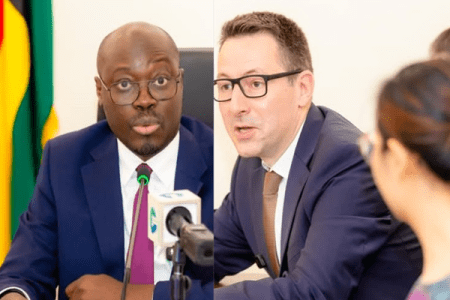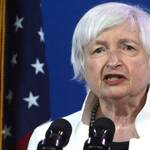Ghana is on the brink of unlocking another tranche of financial support from the International Monetary Fund (IMF) following a staff-level agreement reached between the IMF team and the Ghanaian authorities.
This agreement, which pertains to the fourth review of Ghana’s economic programme under the Extended Credit Facility (ECF), will pave the way for the disbursement of approximately US$370 million, subject to approval by the IMF Executive Board.
Should this approval be granted, Ghana’s total receipts under the ECF programme since May 2023 will rise to about US$2.355 billion, underscoring the depth of IMF’s support for the country’s economic recovery and reform efforts.
IMF team completes mission in Accra
The IMF mission, led by Stéphane Roudet, concluded its visit to Ghana between April 2 and April 15, 2025.
The discussions in Accra reviewed Ghana’s progress under the three-year programme and assessed the government’s performance in implementing critical policy reforms and economic measures.
The ECF arrangement, originally approved in May 2023, commits a total of SDR 2.242 billion—approximately US$3 billion—to support Ghana in restoring macroeconomic stability, improving fiscal discipline, and driving structural reforms across key sectors of the economy.
Economic growth surpasses expectations in 2024
According to Stéphane Roudet, Ghana’s economic growth in 2024 exceeded projections, driven predominantly by robust activity in the mining and construction sectors.
The country’s external position also improved significantly, buoyed by strong gold exports, moderate increases in oil exports, and a healthy inflow of remittances from the Ghanaian diaspora.
This combination of strong external inflows led to international reserves accumulation that far surpassed the targets set under the ECF programme, providing a buffer for the country amid global uncertainties.
Fiscal and inflationary pressures intensify
Despite the positive performance in growth and external balances, the IMF highlighted challenges that emerged toward the end of 2024.
Mr Roudet noted that the programme’s overall performance deteriorated markedly, largely due to fiscal slippages in the run-up to the 2024 general elections.
Preliminary data showed a significant accumulation of unpaid obligations, which led to a fiscal imbalance.
Inflation also breached programme expectations, while several policy actions and reforms in key sectors—including fiscal, financial, and energy—were delayed.
These setbacks posed risks to the momentum of Ghana’s recovery and the credibility of its reform agenda.
Govt responds with corrective fiscal measures
To address the slippages, the new administration has initiated several bold corrective steps.
A national audit has been launched to verify the full extent of the accumulated payables.
Based on preliminary estimates, the government ended the year with a primary budget deficit of around 3.25% of GDP, compared to the original target of a 0.5% surplus.
To reverse this trend, the 2025 national budget has been crafted to achieve a primary surplus of 1.5% of GDP.
The authorities have also introduced critical public financial management reforms, including a strengthened fiscal responsibility framework and tighter rules for expenditure commitments.
Discussions between the IMF and government officials also explored additional policy options to address persistent weaknesses in public procurement and budget execution.
Protecting the vulnerable amid economic adjustments
High inflation continues to impact vulnerable groups across the country.
In response, the government and the IMF are collaborating to reinforce social protection programmes. The aim is to cushion those most affected by rising prices while maintaining the broader objectives of fiscal consolidation.
On the monetary policy front, the Bank of Ghana recently raised its policy interest rate and is re-evaluating its liquidity management strategy.
The tighter monetary stance, when combined with fiscal discipline, is expected to steer inflation downward over the coming months.
Advancing structural reforms across key sectors
The IMF mission also examined the government’s broader structural reform agenda.
A key focus was on improving governance, increasing transparency, and enhancing the efficiency of state-owned enterprises, especially those operating in the gold, cocoa, and energy sectors.
One of the major milestones is the resumption of quarterly electricity tariff adjustments, which, when coupled with structural changes, is expected to reduce the energy sector’s financial shortfall and halt the accumulation of new arrears.
Financial stability has been maintained, with recapitalization of financial institutions progressing steadily.
The government reaffirmed its commitment to further strengthening public banks and ensuring sound financial sector governance.
Steady commitment to debt sustainability
Ghana remains committed to restoring debt sustainability through its ongoing public debt restructuring process.
The recent signing of a Memorandum of Understanding (MoU) between Ghana and its Official Creditors Committee (OCC) under the G20 Common Framework marked a significant milestone.
The focus now shifts to finalizing bilateral agreements that reflect the MoU’s provisions.
At the same time, Ghana continues to engage in good-faith negotiations with commercial creditors to reach an agreement that aligns with IMF programme parameters and upholds the principle of comparability of treatment among creditors.
Constructive engagement
During the mission, the IMF team held extensive meetings with key government officials, including the Minister for Finance, Dr. Ato Forson, and the Governor of the Bank of Ghana, Dr. Johnson Pandit Asiama.
Discussions also involved various ministries, government agencies, and stakeholders from across the economic spectrum.
The IMF expressed appreciation for the Ghanaian authorities’ openness and dedication to the programme, reaffirming its commitment to support the country in achieving a sustainable economic recovery.
- Tuesday, May 6, 2025 Newspaper Headlines - 6 May 2025
- Mahama unveils Code of Ethics for appointees - 5 May 2025
- No system breach, MoMo is safe, secure- MTN - 5 May 2025

